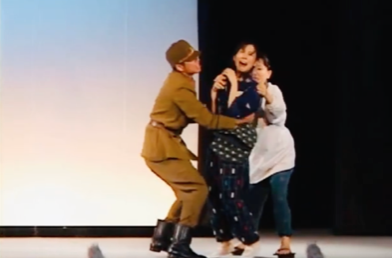Among the unforgettable stages in my career,
one stands out—the August performance
of the play penned by Shintaro Ishihara.
It was my first time portraying a real-life figure.
When I was cast through an audition,
I received an unexpected message
from the family of the woman
I would be portraying—the inspiration
for my role. Though I couldn’t visit Chiran,
the model’s hometown, I was deeply
immersed in the world they shared
with me. They provided letters, documents,
and heartfelt stories, which became
the lifeblood of my preparation.
The more I delved into the family’s memories,
the more I questioned whether I could embody
such a profound role. Fear gripped me—
would I be able to shoulder the weight
of their loss, their hope, and their memories?
I played Ryoko Tabata, the wife of a kamikaze
pilot. My character faced the unbearable anguish
of bidding farewell to her husband, knowing
he would never return. This wasn’t just acting; i
t was a journey into the soul of a woman
who truly lived through one of the most harrowing
experiences imaginable.
The real Ryoko’s husband departed from
the Chiran Air Base, bound for Okinawa,
along with 439 other kamikaze pilots
who never came home. Even after countless
hours of rehearsals and studying the script,
I struggled to capture the desperation
and sorrow that the role demanded.
My voice lacked the conviction, my face
the gravity, and many sleepless nights followed
as I wrestled with my inadequacy.
Every waking moment was spent thinking
of Ryoko, but my heart and body remained
out of sync. The first performance arrived,
and Shintaro Ishihara himself came to offer
encouragement. Members of the Chiran family,
who had entrusted me with their story,
were also in attendance. Yet, the night blurred.
I was so overwhelmed that I scarcely remember
how I performed.
What I do remember is what followed: for a month
after the play’s conclusion, I found it difficult
to distinguish between the stage and reality.
The sound of bombings echoed in my mind
while riding the Yamanote Line, and I repeatedly
dreamt of my on-stage husband’s tragic
fall from the sky. It was as though I had become p
ossessed by Ryoko’s spirit, unable to let her go.
Looking back now, it feels surreal, almost eerie—
but also sacred in its intensity.
At the time, I gave my all to live within Ryoko’s world,
but I didn’t yet understand what my portrayal
should leave with the audience. What message
did they take home? Did they feel the gravity,
the sacrifice, the love? These questions linger.
Today, I want to extend my deepest gratitude
to the director, the cast, and everyone involved
in bringing this play to life. Thank you for entrusting me
with this once-in-a-lifetime role.

先人たちの「想い」を受け継ぐ。 毎年この時期になると、この舞台を思い出します。


コメント